
JANUARY 08TH, 2018
Smilow Center for Translational Research
Rubenstein Auditorium and Lobby
3400 Civic Center Blvd
Philadelphia, PA 19104
2018 SPATIAL AND FUNCTIONAL
GENOMICS SYMPOSIUM
Sponsored By The Penn Epigenetics Institute And The Department Of Bioengineering
KEYNOTE SPEAKERS
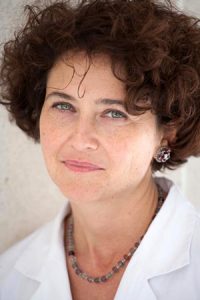
Edith Heard, Ph.D.
EMBL Director General; Professor, College of France;
Director, Genetics and Developmental Biology at Institut Curie
College of France, EMBL, Institut Curie
Edith Heard was born on March 5th, 1965 in London (United Kingdom).
She studied Natural Sciences at Cambridge University, graduating in genetics, and then carried out her PhD at the Imperial Cancer Research Fund (London), working on gene amplification in cancer. During her post doc at the Pasteur Institute in Paris, she began her work on the epigenetic process of X-chromosome inactivation. Since 2001 she has led the Mammalian Developmental Epigenetics team at the Institut Curie and has been director of the Unit of Genetics and Developmental Biology Department since 2010.
She has been awarded several prizes and honours, including the Silver Medal of the CNRS in 2008, the Jean Hamburger Prize (Ville de Paris) in 2009, an ERC Advanced Investigator Award in 2010 and the Grand Prix de la FRM in 2011. She was elected as EMBO member in 2005. In 2012, she was appointed Professor of the Collège de France.
Edith Heard has made many important contributions to the emerging field of epigenetics through her work on one of its most classic examples, X-chromosome inactivation. This process entails the silencing of one of the two X chromosomes during early development in female mammals, enabling dosage compensation between the sexes. This phenomenon of chromosome-wide gene silencing that can be stably propagated during cell division, was discovered more than half a century ago and represents a paradigm for epigenetics. The pioneering work of Edith Heard, using X inactivation as a model system, has shed light on epigenetic mechanisms at multiple timescales: over the cell cycle, during development, across generations and in evolution. Her team revealed the dynamics of this epigenetic process during development – being established early on, then rapidly reversed in a subset of cells that give rise to the embryo-proper. This finding had important general implications for the plasticity of epigenetic states in the embryo, in stem cells and during induced pluripotency. It also had implications in cancer, where dedifferentiation is commonly found and epigenetic plasticity seems to be a hallmark. Edith Heard and her colleagues were also the first to discover the evolutionary diversity of events underlying X inactivation, with striking differences in the timing and manner in which this process is set up between even closely related mammals during early embryogenesis. Her group have also made several discoveries on the mechanisms of X inactivation. They have demonstrated the importance of the spatial organization and dynamics of the two X chromosomes in the nucleus during the initiation of X inactivation. They have also defined some of the first changes in the chromatin status of the X chromosome which can be considered as potential epigenetic marks ensuring the cellular memory of the inactive state.
SCHEDULE
Schedule subject to change. Final schedule will be available week before symposium.
(Click the arrow to display the schedule)
Toggle title
Smilow Center for Translational Research
Rubenstein Auditorium and Lobby
3400 Civic Center Blvd
Philadelphia, PA 19104
Info
Breakfast
Welcome and Introductions
J Larry Jameson, M.D., Ph.D.
Robert G. Dunlop Professor of Medicine
Executive Vice President, University of Pennsylvania Health System
Dean, Perelman School of Medicine at the University of Pennsylvania
David F. Meaney, Ph.D.
Solomon R. Pollack Professor of Bioengineering
Chair, Department of Bioengineering
Shelley L. Berger, Ph.D.
Daniel S. Och University Professor
PIK Professor, Depts., of Cell and Developmental Biology; Biology; Genetics
Director, Epigenetics Institute, Perelman School of Medicine
Chair: Matthew D. Weitzman, Ph.D.
Associate Professor of Pathology and Laboratory Medicine
Genome Regulation in 3D
Bing Ren, Ph.D., Professor of Cellular and Molecular Medicine at the University of California San Diego
3D Epigenome reconfiguration in brain development and disease
Jennifer E. Phillips-Cremins, Ph.D., Assistant Professor Penn Bioengineering, and New York Stem Cell Foundation – Roberts Investigator
Coffee Break & Poster Session
Homologs: imaging, pairing, and ultraconservation
Ting Wu, Ph.D., Professor of Genetics at Harvard Medical School
High-throughput FISH-based screening for regulators of 3D genome organization
Eric F. Joyce, Ph.D., Assistant Professor of Genetics, PSOM
Speed Talks
1 Arunika Das (PSOM – Lampson Lab)
2 Yong Hoon Kim (PSOM – Lazar Lab)
3 Pavel Kuksa (PSOM – Wang Lab)
4 Sara Rouhanifard (Penn Engineering – Raj Lab)
5 James Sun (Penn Engineering – Cremins Lab)
6 Camille Syrett (Penn Vet – Anguera Lab)
Lunch and Poster Session
Chair: Paul M. Lieberman, Ph.D.
Hilary Koprowski, M.D., Endowed Professor; Professor and Program Leader, Gene Expression and Regulation Program; Director, Center for Chemical Biology and Translational Medicine
Genome Architecture Mapping: discovering chromatin contacts in rare cell types
Ana Pombo, Ph.D., Professor, Humboldt University; Max Delbruck Center for Molecular Medicine
Spatial genome re-organization between fetal and adult hematopoietic stem cells
Kai Tan, Ph.D., Associate Professor of Pediatrics at the Children’s Hospital of Philadelphia
Coffee Break
Genome-organizing functions of the nuclear pore complex
Maya Capelson, Ph.D., Assistant Professor of Cell and Developmental Biology, PSOM
Dynamic chromosome structure and function during X-chromosome inactivation
Edith Heard, Ph.D., EMBL Director General; Professor, College of France; Director, Genetics and Developmental Biology at Institut Curie
Poster Awards
Reception
SPEAKERS
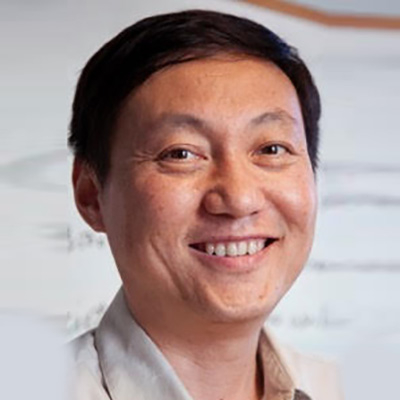
Bing Ren, Ph.D.
Professor of Cellular and Molecular Medicine
University of California San Diego
Dr. Ren is Member of the Ludwig Cancer Research (LCR), Professor of Cellular and Molecular Medicine at the University of California, San Diego (UCSD), and Director of the UCSD Center for Epigenomics. Dr. Ren obtained his Ph.D. from Harvard University in 1998, and subsequently conducted postdoc research at the Whitehead Institute. He joined the faculty at LCR and UCSD in 2001, and was promoted to Associate Professor in 2007 and to Full Professor in 2009. His research focuses on genome organization and epigenomics. His lab has developed transformative tools and concepts for global analysis of gene regulation. He is a recipient of the Chen Award for Distinguished Academic Achievement in Human Genetic and Genomic Research, and an elected fellow of the American Association for the Advancement of Science.
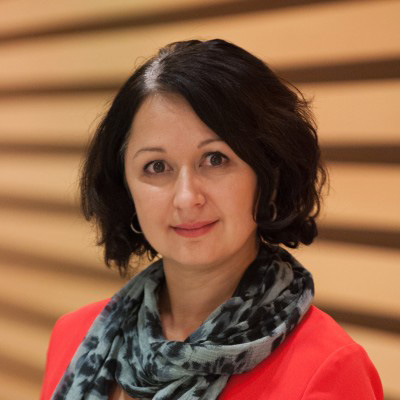
Maya Capelson, Ph.D.
Assistant Professor of Cell and Developmental Biology
University of Pennsylvania, PSOM
The Capelson lab is interested in how the genome is organized inside the nucleus and how this organization contributes to functional regulation of gene activity. Our recent work demonstrated that components of the Nuclear Pore Complex bind and functionally regulate genes undergoing developmental activation. Our current model envisions Nuclear Pores as active participants in the establishment and maintenance of chromatin organization through physical interactions with specific regions of the genome. Using our approaches of Drosophila genetics, chromatin mapping, and high-resolution microscopy, we aim to understand how these interactions are mediated, how they can change in development or disease states, and how they influence the establishment and inheritance of gene expression patterns.
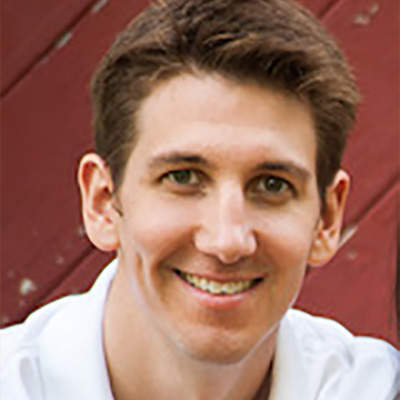
Eric Joyce, Ph.D.
Assistant Professor of Genetics
University of Pennsylvania, PSOM
The Joyce lab studies the spatial organization of the genome, with implications for gene regulation, genome integrity, and diseases such as cancer, aging, and neurodegenerative disorders. We use Drosophila and mammalian systems in combination with cellular, molecular, genetic, and computational tools to elucidate how the structure and position of chromosomes within the nucleus is established and inherited across cell divisions.

Jennifer Phillips-Cremins, Ph.D.
Assistant Professor, Bioengineering
The Cremins Lab focuses on higher-order folding of the genome and how epigenetic marks work through long-range regulatory mechanisms to govern neural connections in the mammalian brain. Much is already known regarding how transcription factors and epigenetic marks work in the context of the linear genome to regulate neuronal development and function. Yet, severe limitations still exist in our ability to apply this knowledge to engineer neuron fate at will or correct brain diseases in vivo. The overarching goal of the Cremins lab is to obtain detailed mechanistic understanding of how the genome is folded and reconfigured during neural lineage commitment and synaptogenesis and how these folding patterns influence the specificity, maturation and pruning of neuronal connections in healthy mammalian brain development. We also study how the genome is misfolded in neurodegenerative disease and we develop tools to engineer 3D genome folding on demand. Addressing this knowledge gap will provide an essential foundation for our long-term goal to engineer the 3-D genome to control neural cell fate in debilitating neurodevelopmental and neurodegenerative diseases.
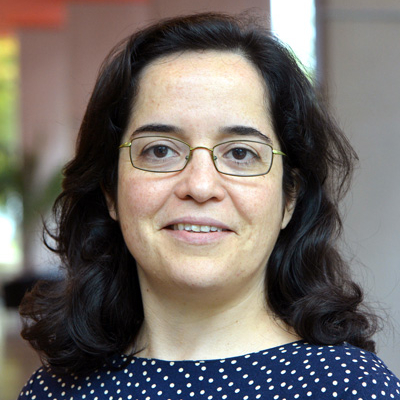
Ana Pombo, Ph.D.
Professor, Humboldt University
Max Delbruck Center for Molecular Medicine
Ana Pombo investigates how the 3D folding of chromosomes influences gene expression in mammalian development and disease, and how poising of RNA polymerase II is regulated to prime genes for future activation. She received her DPhil from University of Oxford (1998, UK) where she pioneered high resolution imaging of transcription sites in mammalian nuclei. She was awarded the Royal Society Dorothy Hodgkin Fellowship (UK; 1998-2002), and started leading her research group in 2000 at the MRC Clinical Sciences Centre, Imperial College London (UK). Her laboratory showed that Polycomb repression is associated with RNA polymerase II poising, and developed high-resolution cryoFISH approaches to study spatial relationships between genomic regions and nuclear landmarks. She was awarded the Robert Feulgen Prize 2007 for her contributions to imaging nuclear architecture. Her laboratory moved to the Berlin Institute for Medical Systems Biology, at the Max Delbrueck Center (Berlin, Germany) in 2013, and she was appointed Professor (W3) at Humboldt University of Berlin. Her laboratory has developed Genome Architecture Mapping, an orthogonal ligation-free approach to map chromatin contacts genome-wide.
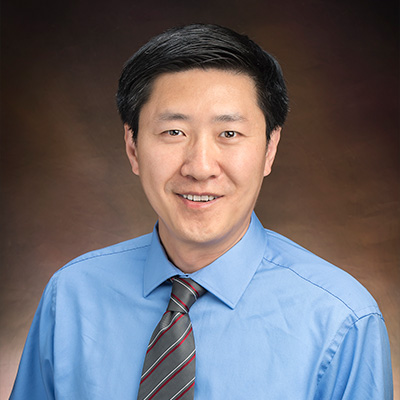
Kai Tan, Ph.D.
Associate Professor, Pediatrics
The Children’s Hospital of Philadelphia
The Tan lab is interested in Systems Biology of gene regulation. Gene expression variations play a major role in driving phenotypic variations. Because gene expression can be modulated at multiple levels, it is a challenging task to study gene regulatory systems. The advent of various functional genomics technologies increasingly allows us to interrogate the status of a cell’s components and to determine how, when, and where these molecules interact with each other. On the other hand, the availability of a large number of sequenced genomes has enabled powerful comparative approaches to study a variety of biological questions. Our research takes advantage of the strength of Systems Biology and Comparative Genomics to understand gene regulation.

Ting Wu, Ph.D.
Professor, Department of Genetics
Harvard Medical School
Ting (C.-ting) Wu, Ph.D., is a Professor of Genetics at Harvard Medical School. She is also the Director of the Consortium for Space Genetics and the Director of the Personal Genetics Education (pgEd.org) Project. She received her B.A. from Harvard University in Biology and her Ph.D. from Harvard Medical School in Genetics. Her laboratory studies the behavior of homologous chromosomes – how they sense each other and, under certain circumstances, physically pair – and her presentation will summarize their progress in a) developing of tools for visualizing the genome, including in situ sequence-specific single-molecule super-resolution imaging, b) using SNP-facilitated homolog-resolved Hi-C to reveal the structure of paired homologs, and c) studying the puzzle of mammalian ultraconserved elements (UCEs), which are DNA sequences that have been maintained at the highest (100%) level of conservation for hundreds of millions of years and yet whose existence has defied easy explanation.
SYMPOSIUM FLYER
REGISTER
Registration and abstract submission closes on January 4, 2018.
**The top 6 abstracts will be selected for 5-minute speed talks at the symposium.
